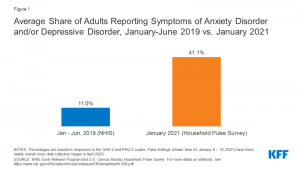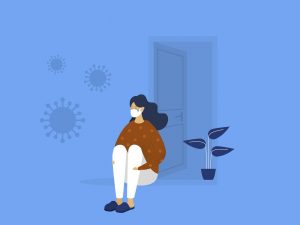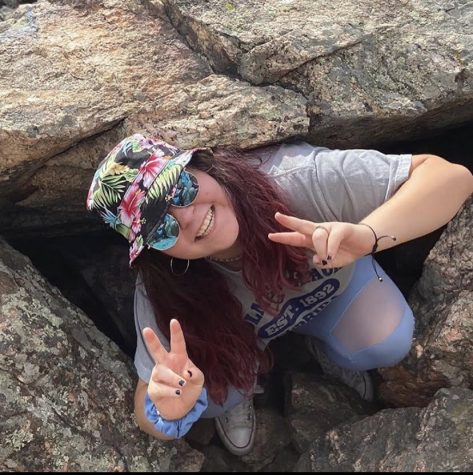Mental Health Awareness Inspired by COVID-19
April 29, 2021

Due to COVID-19 there has been a spike in mental health issues. Symptoms of anxiety and/or depression have risen 30% in adults alone in the past year. People were and still are being isolated from friends and family. Some were forced to stay in their toxic households and there has been a rise in child abuse during the pandemic. Millions of Americans have been laid off from their jobs due to COVID-19. Everyone has had a hard time with the pandemic.
Parents especially have had an increase in anxiety and depression symptoms. Parents were forced to take care of their children and work at the same time. Taking care of children can be a stressful and normally parents could rely on their parents or babysitter, but everything was on them now. Online School is also difficult for parents, especially those with lower income who don’t have money for a computer for each child. Plus, younger kids are too clumsy for some technology, and lack the attention span to focus on a computer screen all day. Even with both parents experiencing high levels of stress, Moms felt 49.3% more (women reported symptoms of anxiety and/or depression) than the Dads at 40.3% (men reported symptoms of anxiety and/or depression).

Minorities have also had more symptoms of anxiety and/or depression than Caucasians. 48% of African Americans and 46.3% of Hispanics have experienced symptoms compared to 40% of Caucasians. Some reasons there is a higher percentage for minorities is they have higher cases of deaths and COVID-19 cases, higher reports of lack of education for their children, and the way the health care system mistreats them. Many minorities are at a disadvantage and this pandemic has pushed them even harder.
Adolescents are at a higher risk for mental illness, especially minorities and LGBTQ youth. Suicide is the second leading cause of death for adolescents, and has been for awhile. The pandemic, like many, has increased the depression and anxiety in adolescents. One in three girls and one in ten boys have reported new or worsening depression and/or anxiety.
 Sadly, it took a pandemic for politicians to start paying attention to mental health. However, Colorado is passing a bill to provide free screenings and therapy for age 18 and younger, which is a huge deal considering that suicide rates for teenagers have increased 60% since 2007.
Sadly, it took a pandemic for politicians to start paying attention to mental health. However, Colorado is passing a bill to provide free screenings and therapy for age 18 and younger, which is a huge deal considering that suicide rates for teenagers have increased 60% since 2007.
Even as we move forward to the end of this pandemic, that doesn’t mean that mental illnesses is ending too. The fight for better mental health care doesn’t end here.
